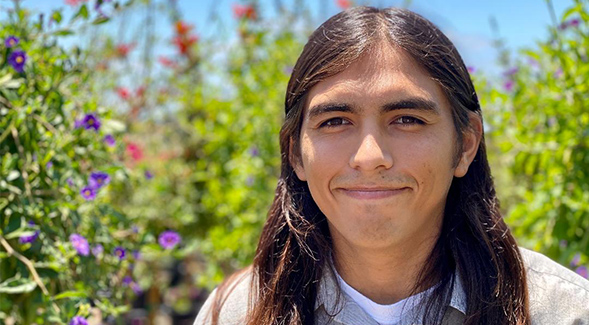Environmental Commitment Draws Student Fellowship
Thomas Morales plans to use his environmental science studies to help repair historic damage to his native lands.

Alongside his father, a fisherman, Thomas Morales spent a lot of time growing up outside and in nature. It was in nature that he developed a strong interest in plants, wildlife and water.
As time went on, Morales began to notice changes to his environment, including those on his native land as a member of the Te-Moak Tribe of Western Shoshone Indians of Nevada.
“I have a longstanding relationship with the environment, and I’ve seen human-caused degradation of every lake, river and stream that I have been to,” said Morales. These outdoor experiences, coupled with his education and cultural teachings, led him to develop an interest in protecting and conserving the environment.
While completing his bachelor’s degree in environmental science at San Diego State University, Morales learned what was happening to the environment on a larger scale. He then decided to take a deeper look at the environment and patterns of changes in Western Shoshone land.
Today, Morales is actively engaged in research with longer-term plans to help reverse some of the concerning human-caused environmental contamination issues present in tribal lands.
“There is a lot of human impact on our land due to gold mining, silver mining, intensive agriculture and nuclear bomb testing,” said Morales. “All of these human interactions cause negative impacts to Western Shoshone territory, and I plan to alleviate this throughout my career. I plan to restore what has been done.”
Morales’ commitment to the future of his Indigenous community, their land and the environment in general has earned him recognition as SDSU’s second-ever Switzer Fellow.
The Switzer Fellowship offers a year of support to highly talented graduate students in New England and California whose studies and career goals are directed toward environmental improvement and who clearly demonstrate leadership in their field.
The fellowship includes a $15,000 award for academic study, leadership training, access to a vibrant network of more than 650 Switzer Fellowship alumni, and opportunities for professional development during and after the fellowship year.
Finding Solutions
Working in the lab of School of Public Health professor Eunha Hoh, Morales monitors and evaluates chemical contaminants in water. His research focuses on chemicals that are often found in personal care products as well as pesticides, herbicides and pharmaceuticals. Many of these contaminants remain in wastewater even after it has been treated. Morales looks at how they remain in that water and how they may be impacted by sunlight.
Morales explains that there is very little in place to stop many of the contaminants mentioned from making their way into water and wetlands. Even once this water is treated for other chemicals and bacteria, many substances remain that damage the environment and may be harmful to wildlife and humans.
“Better monitoring, controlling and understanding of emerging contaminants is necessary for protecting the public as well as the environment, since many of these emerging contaminants lack regulation,” said Morales, who is entering the second year of his master’s degree in public health at SDSU with an emphasis in environmental science.
In the future, Morales hopes to help restore degraded lands and provide safe and clean water to the people of the Western Shoshone Nation and across the country.
Finding Purpose
Morales said he is excited to be working with others in the environmental science fields and to be given access to a variety of resources.
“Applying to the fellowship was a very in-depth process but it made me realize who I am, where I am, what I am doing and what my importance is,” said Morales. “The process helped me learn a lot more about me and my culture and really opened my eyes to what my purpose is as an environmental scientist for the last five years.”
Morales is only the second SDSU student to receive the fellowship, and has close ties to the previous recipient, Jade Johnson. The two met through SDSU’s Elymash Yuuchaap program, which translates from Kumeyaay to “Youth Think.”
Together, they mentored incoming SDSU freshmen and helped them navigate college life. “That’s where I met Jade and from then on I looked up to her. After she received the fellowship she mentioned it to me and pointed me toward applying,” Morales said.
Proud of her student’s recognition, Hoh says Morales is deserving of the fellowship and believes he will be the leader his community needs.
“We need leaders with Native American heritage who are educated in science, especially environmental science,” said Hoh. “Their leadership will be more inspiring to their own communities, which will help all of us to pursue common goals for environmental conservation, protection, restoration, and sustainability in the nation. I truly believe that Thomas will become one of the leaders.”
Morales is hoping to not only restore his physical land but become a mentor and inspiration to his community.
“There is a great need to increase the amount of Indigenous youth involved and interested in STEM,” said Morales. “It is vital to get that pathway flowing sooner than later. We need more native teachers and we need more people spreading our truth. I am proud to be someone who can help native youth visualize themselves in bigger arenas.”



